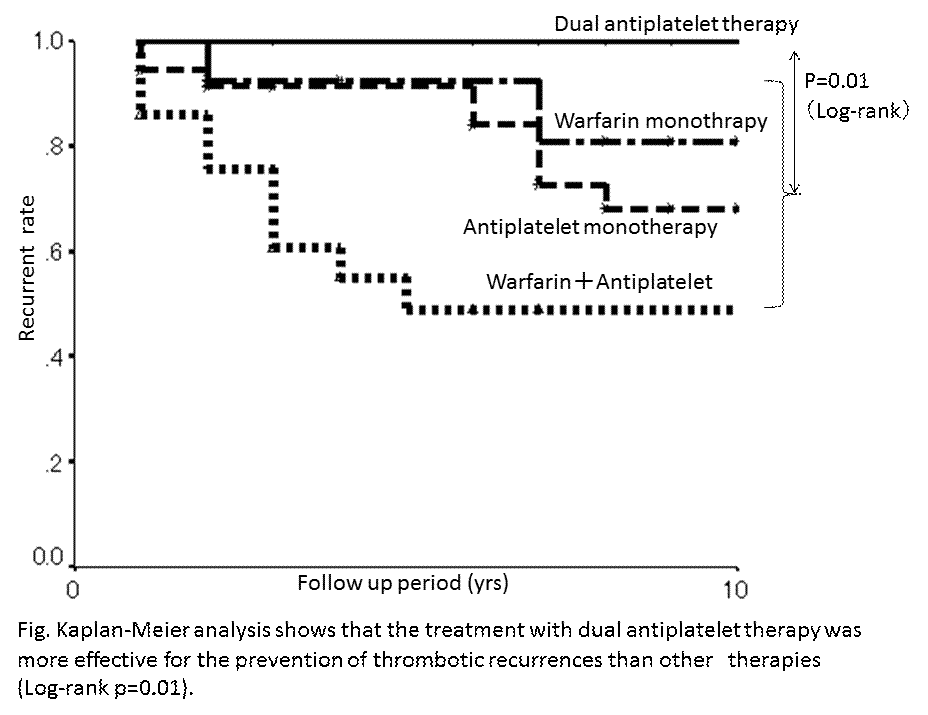Background/Purpose: Arterial thrombosis (AT) is a major clinicalmanifestation of the antiphospholipid syndrome (APS). A number of studies have evaluated the rate of recurrent thromboembolism, including arterial and venous thrombosis, after an initial event in patients with APS. Regardless of the presence of warfarin therapy, recurrent events were seen in >11% of APS patients-year. Therefore, the optimal treatment for recurrent AT in patients with APS remains unclear. The purpose of this study is to clarify the efficacy of prophylaxis for recurrent AT in patients with APS.
Methods: This study comprised 82 unselected consecutive APS patients with AT recruited at one single center. Patients were included in this observation study at the initial arterial thrombotic event and followed up. We retrospectively assessed the efficacy and safety of several therapies for the secondary prevention of AT in those patients.The recurrence rate of AT was analyzed as the efficacy outcome and the occurrence of major bleeding event and overall mortality as the safety outcome. The evaluated therapies include warfarin monotherapy (Group1), antiplatelet monotherapy (Group2), combination therapy with warfarin and antiplatelet agent (Group3), and dual antiplatelet therapy (Group4).
Results: Among all the patients, 67 (76%) were females, the mean age was 44 years (range 15-74 years) and 51 (62%) were diagnosed as systemic lupus erythematosus. The mean follow up period was 8.5 years (range 2-22 years). Thirteen (16%) patients were in Group1, 35 (43%) in Group2, 21 (26 %) in Group3, and 13 (16 %) in Group4. Antiplatlet therapy consisted on aspirin, ticlopidine, clopidogrel, cilostazol, or others such as dipyridamole,beraprost and sarpogrelate hydrochloride. Distribution of antiplatelet agents in each group is shown in Table. Dual antiplatelet treatment comprised 7 (54%) patients on aspirin and ticlopidine/clopidogrel, 3 (23%) on aspirin and others, 2 (15%) on aspirin and cilostazol, 1 (8%) on cilostazol andticlopidine.
Thrombotic events recurred in 25 patients (3.4 100 patient-year). No recurrences were observed in the Group 4. However, a high incidence of recurrences rate observed in Groups 1, 2, 3 (Log-rank p=0.01) (Fig).There was no statistically significant difference in the bleeding events nor in the mortality rate between the study groups.
Conclusion: Dual antiplatelet therapy may be an effective therapy for prevention of recurrent arterial thrombosis in patients with APS.
Disclosure:
Y. Fujieda,
None;
O. Amengual,
None;
T. Watanabe,
None;
M. Kono,
None;
Y. Kanetsuka,
None;
T. Kurita,
None;
T. Odani,
None;
K. Otomo,
None;
T. Bohgaki,
None;
T. Horita,
None;
S. Yasuda,
None;
T. Atsumi,
None.
« Back to 2012 ACR/ARHP Annual Meeting
ACR Meeting Abstracts - https://acrabstracts.org/abstract/dual-antiplatelet-therapy-as-prophylaxis-of-recurrent-arterial-thrombosis-in-patients-with%e3%80%80antiphospholipid-syndrome/


